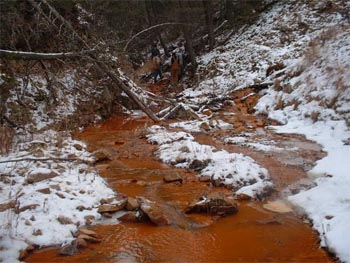Harlem, Montana -- Since 1992, the Indian Law Resource Center has represented the Assiniboine and Gros Ventre Tribes in several cases aimed at shutting down the Zortman and Landusky mines - large open-pit, cyanide heap leach gold mines - and bringing the sites into compliance with environmental and water quality standards.
 |
| Swift Gulch runs through the reservation. This photo was taken prior to treatment facilities coming online. ILRC photo. |
Since the opening of the Zortman and Landusky mines in 1979 just south of the Fort Belknap Indian Reservation, the culture and environment of the Assiniboine and Gros Ventre peoples have been seriously threatened. The mines have contaminated surface and groundwater resources upon which tribal members depend, destroyed countless sacred sites, degraded and eliminated wildlife habitat, and generally cast a long shadow over the unique way of life that the Tribes maintain.
Through our long history of work with the Tribes, we filed successful challenges to the inadequate clean-up of the mine sites under the Clean Water Act, and eventually the mines were forced into bankruptcy. However, that did not mean our work on behalf of the Tribes stopped. We continued to help the Tribes to demand the first-ever complete reclamation of these two open-pit mines.
Over the years, we have been able to demonstrate how Indian governments can successfully hold corporate and government actors accountable while leading a coalition of diverse stakeholders. And today, we are continuing to represent the Tribes in their fight for clean water.
Although the mines are no longer in operation, tribal water resources continue to be threatened by the phenomenon of acid rock drainage and water leaving the mines will need to be treated forever in order to meet basic public and environmental health standards.
Unfortunately, it is anticipated that there will be funding shortfalls for operation costs of the two current water treatment facilities beginning in 2010. Without additional money to meet the funding shortfall, the water treatment facilities may have to shut down for prolonged periods each year, resulting in increased poisons in the water.
We recently participated in a planning meeting between the Tribes, state officials and representatives from the U.S. congressional delegation of Montana to develop a strategy to better address the water treatment needs at the mine sites.
Throughout our long partnership with the Tribes, we have succeeded in compelling the state and federal governments to clean up the contamination at the Zortman-Landusky mines. We are hopeful that this current effort at collaboration will ensure adequate water treatment at the mines into the future.

Fort Belknap's President Julia Doney and Center Attorney Lucy Simpson meet with Montana State officials regarding funding for water treatment facilites.